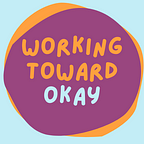Something Blue
The wedding is approaching. It carries a suitcase bursting at the seams.
I have no choice but to unpack all the family, heritage, history and expectations that come spilling forth. Everyone swears it will be okay, that all those pressures will fade away when I look at Noor. I can’t tell you how much I want this to be true. I’m afraid to look around and see what’s missing. That feeling is all too familiar to me — innocently glancing around to take stock of a group and finding myself alone. On my wedding day, the people who raised me will be there. So will their families. The man I’m marrying will be there. So will his family. This multicultural group will be swirling around me — South Asian and white, Muslim and Christian. But I’ll be a tiny island in the middle of it all.
And just like that, I’m back in my grandmother’s living room, surrounded by people and presents and the scent of pine and Christmas cookies. It’s 2012 and I’m just a high school student. Around me are the people I have mistaken for mirrors. Suddenly I realize the color of my skin is not a mask — I can’t simply take it off at the end of the day. I have to live with the fact that I don’t belong. I don’t feel unloved or rejected by the people sitting around me, yet somehow that makes the discovery even worse. It means their love can’t ever be enough. My family is gone. One family is here in front of me, of course. But the people who created me, the ones who came before, are not with me. They won’t be at my graduation or watch me go to college.
They won’t be at my wedding.
I don’t think anyone realizes how difficult this process is for me. It’s more than the flowers and the speeches and the guest dynamics, and I don’t think I could have predicted it myself. To some people, it looks like I have it fairly easy. The majority of the guest list is from my side of the family, and the reception is going to be more American than Pakistani in both style and structure. This may even feel unfair to my fiancé’s family. So I don’t know how to explain that I feel more abandoned than ever. My blood family and culture will not be truly represented.
Milestones feel like booby traps. I jump from one stepping stone to the next, nervous and excited like everyone else. But the next thing I know, the ground drops out from beneath me. Something innocuous will trigger a wave of spiraling thoughts: I don’t know my family. I don’t know my heritage. My mother and father won’t get to see me get married. They will never get to know me at all. Would they even like me if they did? Why did they leave me behind and move on with their lives? Why can’t I seem to move on with mine?
There’s no real solution to my dilemma. It’s the sort of thing I just need to acknowledge and make clear to the people who care about me. I know the same spiraling thoughts will hit me again. Maybe it will happen when I mail the last invitation and reflect on all the people who won’t be getting one. Maybe it will be when I put on my Pakistani ceremony outfit and think about all the Peruvian and Mexican wedding customs I know nothing about.
I know for sure it will happen when I look out at the crowd on what is meant to be one of the happiest days of my life. Thank God there will be something else to focus on. Because Noor and I chose each other equally. Ours is a union born of free will, not abandonment or coercion. There are no conditions, and a lifetime of family history is yet to be made. I can’t rebuild what is already lost. Maybe whatever we create for ourselves will be enough for me one day.
Originally published at workingtowardokay.com on October 11, 2020.
